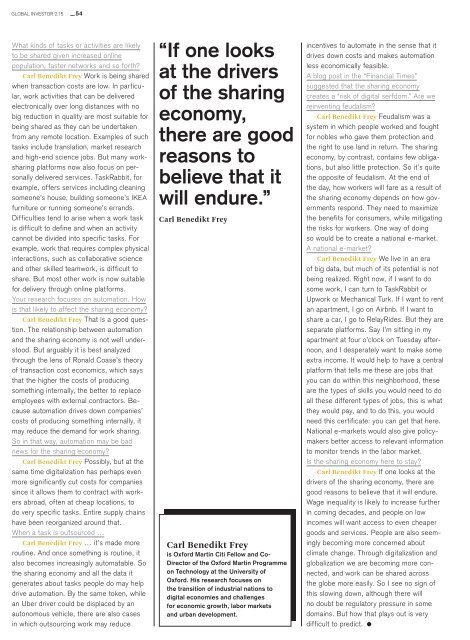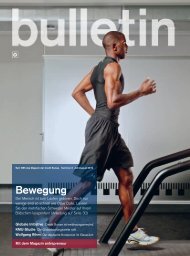The sharing economy
New opportunities, new questions Global Investor, 02/2015 Credit Suisse
New opportunities, new questions
Global Investor, 02/2015
Credit Suisse
You also want an ePaper? Increase the reach of your titles
YUMPU automatically turns print PDFs into web optimized ePapers that Google loves.
GLOBAL INVESTOR 2.15 — 54<br />
What kinds of tasks or activities are likely<br />
to be shared given increased online<br />
population, faster networks and so forth?<br />
Carl Benedikt Frey Work is being shared<br />
when transaction costs are low. In particular,<br />
work activities that can be delivered<br />
electronically over long distances with no<br />
big reduction in quality are most suitable for<br />
being shared as they can be undertaken<br />
from any remote location. Examples of such<br />
tasks include translation, market research<br />
and high-end science jobs. But many work<strong>sharing</strong><br />
platforms now also focus on personally<br />
delivered services. TaskRabbit, for<br />
example, offers services including cleaning<br />
someone’s house, building someone’s IKEA<br />
furniture or running someone’s errands.<br />
Difficulties tend to arise when a work task<br />
is difficult to define and when an activity<br />
cannot be divided into specific tasks. For<br />
example, work that requires complex physical<br />
interactions, such as collaborative science<br />
and other skilled teamwork, is difficult to<br />
share. But most other work is now suitable<br />
for delivery through online platforms.<br />
Your research focuses on automation. How<br />
is that likely to affect the <strong>sharing</strong> <strong>economy</strong>?<br />
Carl Benedikt Frey That is a good question.<br />
<strong>The</strong> relationship between automation<br />
and the <strong>sharing</strong> <strong>economy</strong> is not well understood.<br />
But arguably it is best analyzed<br />
through the lens of Ronald Coase’s theory<br />
of transaction cost economics, which says<br />
that the higher the costs of producing<br />
something internally, the better to replace<br />
employees with external contractors. Because<br />
automation drives down companies’<br />
costs of producing something internally, it<br />
may reduce the demand for work <strong>sharing</strong>.<br />
So in that way, automation may be bad<br />
news for the <strong>sharing</strong> <strong>economy</strong>?<br />
Carl Benedikt Frey Possibly, but at the<br />
same time digitalization has perhaps even<br />
more significantly cut costs for companies<br />
since it allows them to contract with workers<br />
abroad, often at cheap locations, to<br />
do very specific tasks. Entire supply chains<br />
have been reorganized around that.<br />
When a task is outsourced …<br />
Carl Benedikt Frey … it’s made more<br />
routine. And once something is routine, it<br />
also becomes increasingly automatable. So<br />
the <strong>sharing</strong> <strong>economy</strong> and all the data it<br />
generates about tasks people do may help<br />
drive automation. By the same token, while<br />
an Uber driver could be displaced by an<br />
autonomous vehicle, there are also cases<br />
in which outsourcing work may reduce<br />
“If one looks<br />
at the drivers<br />
of the <strong>sharing</strong><br />
<strong>economy</strong>,<br />
there are good<br />
reasons to<br />
believe that it<br />
will endure.”<br />
Carl Benedikt Frey<br />
Carl Benedikt Frey<br />
is Oxford Martin Citi Fellow and Co-<br />
Director of the Oxford Martin Programme<br />
on Technology at the University of<br />
Oxford. His research focuses on<br />
the transition of industrial nations to<br />
digital economies and challenges<br />
for economic growth, labor markets<br />
and urban development.<br />
incentives to automate in the sense that it<br />
drives down costs and makes automation<br />
less economically feasible.<br />
A blog post in the “Financial Times”<br />
suggested that the <strong>sharing</strong> <strong>economy</strong><br />
creates a “risk of digital serfdom.” Are we<br />
reinventing feudalism?<br />
Carl Benedikt Frey Feudalism was a<br />
system in which people worked and fought<br />
for nobles who gave them protection and<br />
the right to use land in return. <strong>The</strong> <strong>sharing</strong><br />
<strong>economy</strong>, by contrast, contains few obligations,<br />
but also little protection. So it’s quite<br />
the opposite of feudalism. At the end of<br />
the day, how workers will fare as a result of<br />
the <strong>sharing</strong> <strong>economy</strong> depends on how governments<br />
respond. <strong>The</strong>y need to maximize<br />
the benefits for consumers, while mitigating<br />
the risks for workers. One way of doing<br />
so would be to create a national e-market.<br />
A national e-market?<br />
Carl Benedikt Frey We live in an era<br />
of big data, but much of its potential is not<br />
being realized. Right now, if I want to do<br />
some work, I can turn to TaskRabbit or<br />
Upwork or Mechanical Turk. If I want to rent<br />
an apartment, I go on Airbnb. If I want to<br />
share a car, I go to RelayRides. But they are<br />
separate platforms. Say I’m sitting in my<br />
apartment at four o’clock on Tuesday afternoon,<br />
and I desperately want to make some<br />
extra income. It would help to have a central<br />
platform that tells me these are jobs that<br />
you can do within this neighborhood, these<br />
are the types of skills you would need to do<br />
all these different types of jobs, this is what<br />
they would pay, and to do this, you would<br />
need this certificate: you can get that here.<br />
National e-markets would also give policymakers<br />
better access to relevant information<br />
to monitor trends in the labor market.<br />
Is the <strong>sharing</strong> <strong>economy</strong> here to stay?<br />
Carl Benedikt Frey If one looks at the<br />
drivers of the <strong>sharing</strong> <strong>economy</strong>, there are<br />
good reasons to believe that it will endure.<br />
Wage inequality is likely to increase further<br />
in coming decades, and people on low<br />
incomes will want access to even cheaper<br />
goods and services. People are also seemingly<br />
becoming more concerned about<br />
climate change. Through digitalization and<br />
globalization we are becoming more connected,<br />
and work can be shared across<br />
the globe more easily. So I see no sign of<br />
this slowing down, although there will<br />
no doubt be regulatory pressure in some<br />
domains. But how that plays out is very<br />
difficult to predict.

















